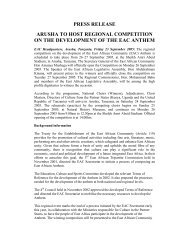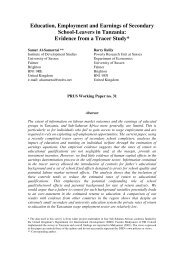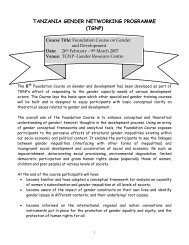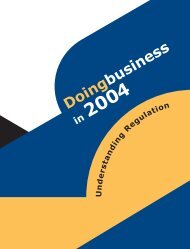Designing e-Government for the Poor - Tanzania Development ...
Designing e-Government for the Poor - Tanzania Development ...
Designing e-Government for the Poor - Tanzania Development ...
You also want an ePaper? Increase the reach of your titles
YUMPU automatically turns print PDFs into web optimized ePapers that Google loves.
54<br />
Summary of Country Reports<br />
B. Cambodia<br />
In August 2000, <strong>the</strong> <strong>Government</strong> of Cambodia established <strong>the</strong> National<br />
In<strong>for</strong>mation Communication Technology <strong>Development</strong> Authority<br />
(NiDA). In 2001, <strong>the</strong> <strong>Government</strong> of Cambodia enacted <strong>the</strong> e-<strong>Government</strong><br />
Project. As a result, 27 ministries and governmental institutions are connected<br />
by one online network, and 76 communes and seven districts of <strong>the</strong><br />
Phnom Penh Municipality are connected by <strong>the</strong> Internet. NiDA has offered<br />
ICT training courses to government officials, Phnom Penh municipality, and<br />
schools. An electronic approval system (EAS), resident registration system,<br />
vehicle registration system, and real estate in<strong>for</strong>mation system will be<br />
introduced to execute <strong>the</strong> government administrative tasks. The population<br />
of Cambodia is 13 million people, and <strong>the</strong>re are approximately 800,000<br />
telephones. The total number of fixed line telephones in Cambodia is quite<br />
small with approximately 30,000 subscribers. Four mobile phone operators<br />
serve a total of 710,000 subscribers. Finally, <strong>the</strong>re are six operating Internet<br />
service providers serving around 12,000 Internet subscribers.<br />
The <strong>Government</strong> of Cambodia has promoted <strong>the</strong> establishment of <strong>the</strong><br />
ICT infrastructure by encouraging investments of <strong>the</strong> public and private<br />
sectors. Most public servants are unable to carry out <strong>the</strong>ir duties properly<br />
due to <strong>the</strong> lack of basic facilities such as phone or e-mail services. In order<br />
to create a conducive environment <strong>for</strong> ICT development, <strong>the</strong> government of<br />
Cambodia need to focus on development of infrastructure, human capacity,<br />
enterprises, and contents and applications including use of local language<br />
and computer literacy.<br />
C. China<br />
China has recently undergone significant trans<strong>for</strong>mations in ICT<br />
development. In July 2004, <strong>the</strong> number of telephone subscribers exceeded<br />
600 million, among which 299 million are fixed telephone, and 310 million<br />
are mobile phone subscribers. Internet service has been in operation since<br />
1993. In July 2004, <strong>the</strong> number of Internet users increased to 87 million.<br />
The increase in Internet usage has been propelled with <strong>the</strong> presence of<br />
more value added service (VAS) providers. In 1995, <strong>the</strong>re was just one<br />
VAS provider, but by <strong>the</strong> year 2000 <strong>the</strong>re were more than 100 VAS<br />
providers. Policies and regulations have been established to create an<br />
environment conducive to <strong>the</strong> development of an ICT infrastructure. The<br />
Computer In<strong>for</strong>mation Network Link Policy Act was passed in 1997,<br />
China’s Telecom Regulations was enacted in 2000, and an E-signature Act<br />
will take effect in April 2005. Approximately 303 cities out of 336 (90.2<br />
per cent) have <strong>the</strong>ir own web site. In<strong>for</strong>mation service is still <strong>the</strong> main<br />
function of <strong>the</strong> web sites, and two-way interactions (online transaction) are<br />
still limited.

















